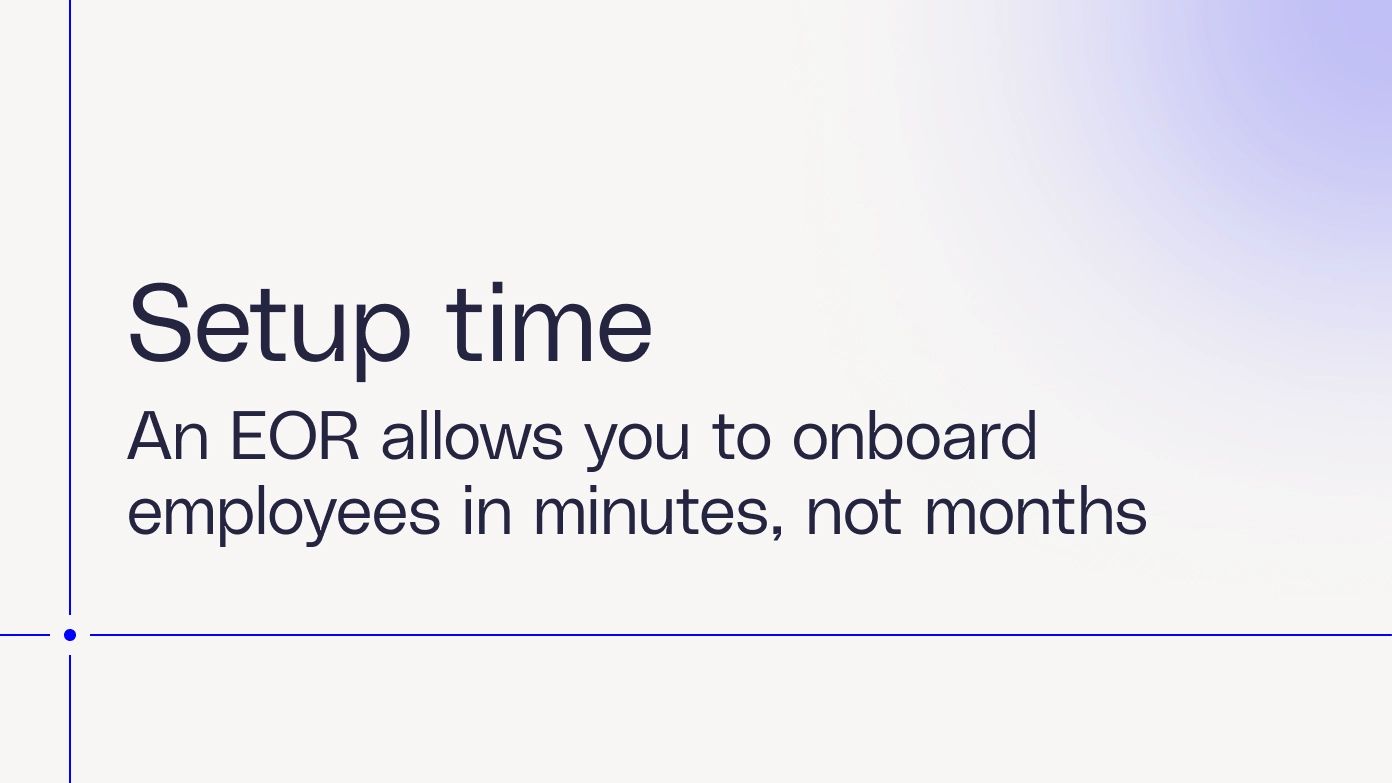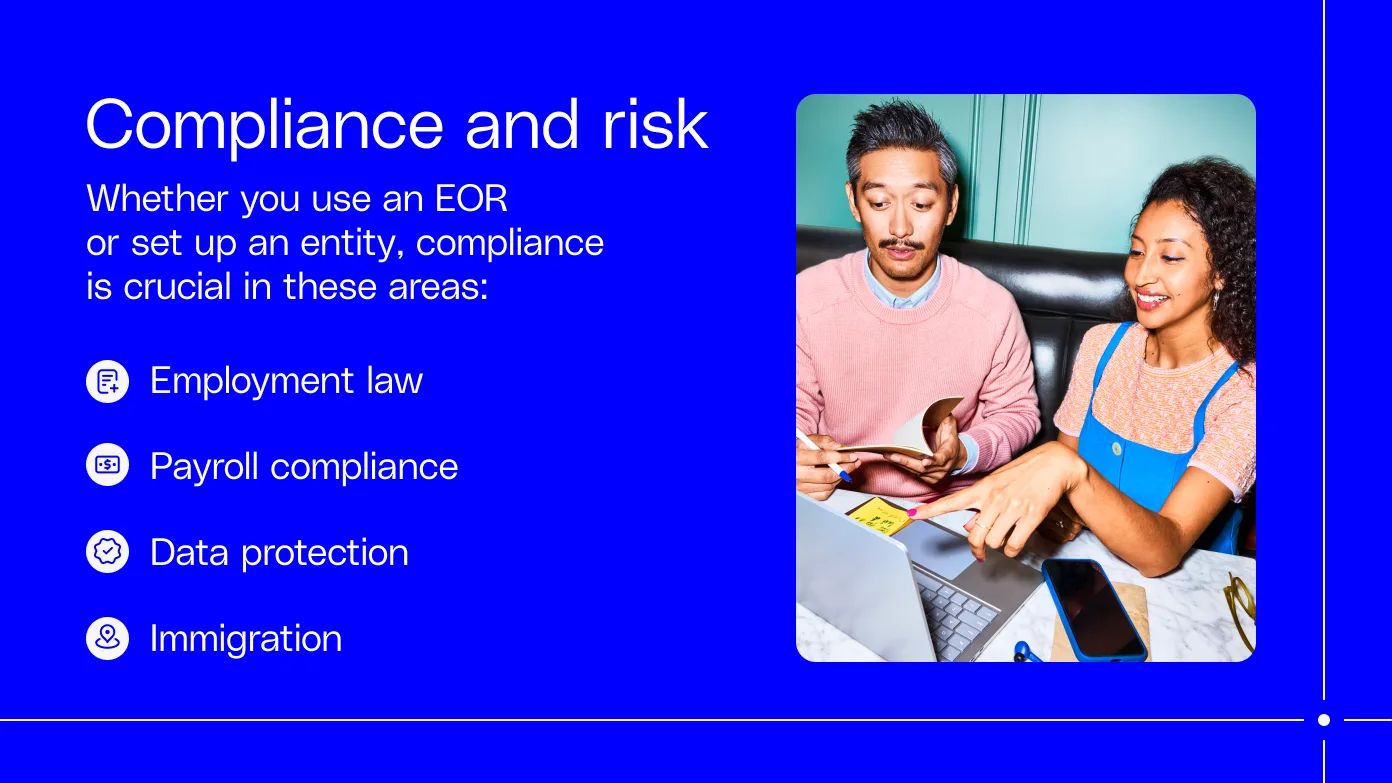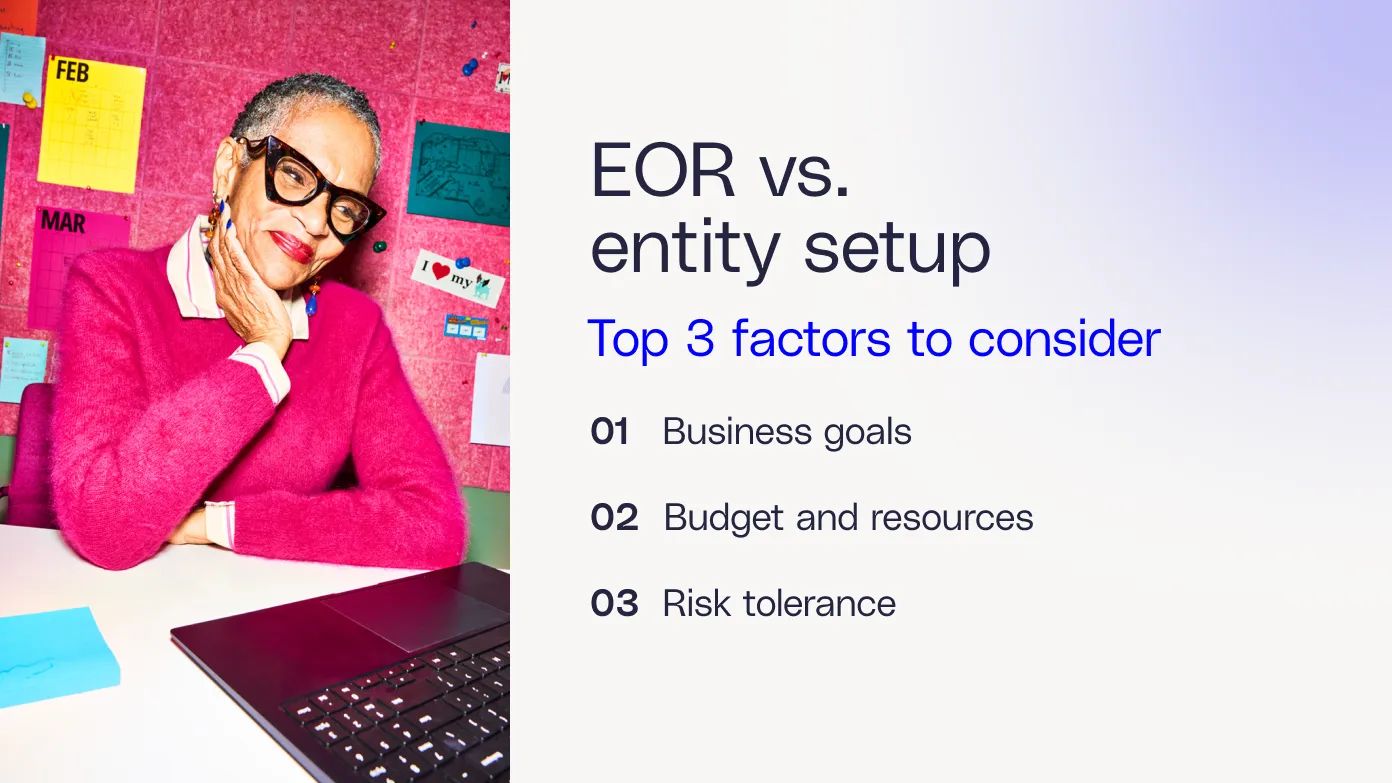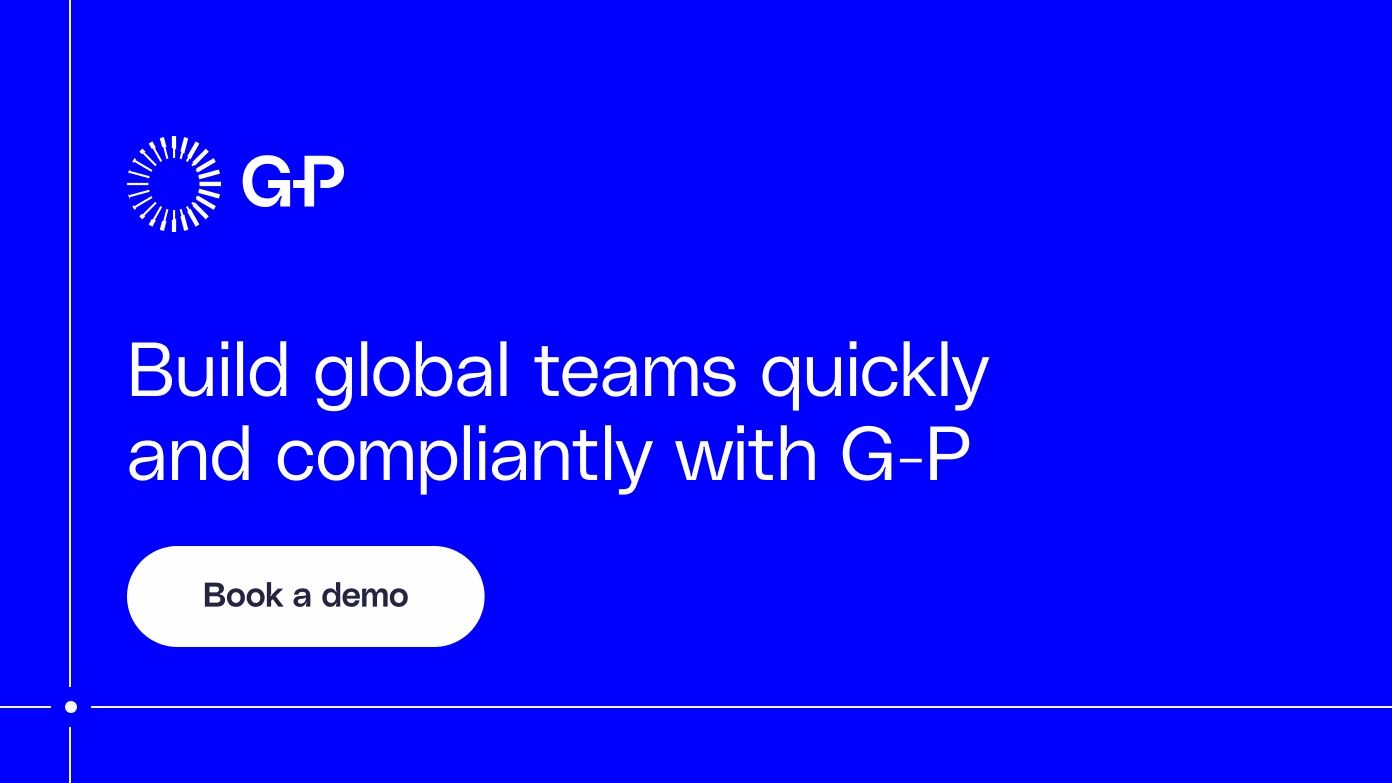전 세계적으로 경제 압박이 커짐에 따라 기업들은 글로벌 고용을 통해 수익 흐름을 다각화하고 전략적 성장을 달성하고 있습니다.
전 세계적으로 고용하는 방법은 두 가지가 있습니다. 즉, 기록상 고용주(EOR)와 협력하거나 현지 법인을 설립하는 것입니다. 결정은 고유한 비즈니스 요구와 우선순위에 따라 달라집니다. 이 가이드는 정보에 입각한 선택을 하는 데 도움이 되는 EOR과 법인 간의 차이점을 설명합니다.
EOR 모델
EOR은 다른 회사를 대신하여 전문가를 법적으로 고용합니다. 이 모델을 사용하면 각 국가에 법인을 설립하지 않고도 어디서나 채용하고 글로벌 인력을 구축할 수 있습니다. EOR은 현지 노동 및 고용법 준수를 관리하고 급여, 세금, 복리후생 및 기타 HR 프로세스를 처리합니다. EOR을 사용하면 전체 고용 라이프사이클을 간소화하고 핵심 비즈니스 활동에 집중할 수 있습니다.
글로벌 법인 모델
법인 설립은 전 세계 고용에 대한 전통적인 접근 방식입니다. 엔터티에는 두 가지 주요 유형이 있습니다.
-
자회사: 모회사가 전체 또는 부분 소유권을 가지고 있는 독립적으로 운영되는 법인. 자회사는 자체 규정 준수에 대한 책임이 있지만 모회사는 현지 법률 및 규정에 따라 책임으로부터 보호받을 수 있습니다. 자회사에 대한 모회사의 투자는 규정 준수 문제가 발생할 경우 위험에 처하게 됩니다.
-
지점: 지점은 별개의 법인이 아니라 모회사가 사업을 수행하는 데 사용하는 등록된 국제 사무소입니다. 모회사는 규정 준수에 대해 전적인 책임을 집니다.
글로벌 법인 설정은 다음과 같은 광범위한 프로세스입니다.
-
시장 및 규제 환경 조사
-
엔터티 유형 선택
-
현지 당국 등록 및 통합
-
면허 및 허가 취득
-
현지 은행 계좌를 개설합니다.
-
HR 및 급여 프로세스 수립
-
고용, 노동 및 세법의 지속적인 준수 보장
EOR 대 글로벌 법인: 나란히 비교
EOR과 글로벌 법인은 각각 자체적인 혜택을 가지고 있으며 기업에 다르게 서비스를 제공합니다. 다음은 설정 시간, 복잡성, 비용, 유연성 및 규정 준수 위험 측면에서 비교한 방법입니다.

EOR을 사용하면 글로벌 시장에 쉽게 액세스할 수 있습니다. EOR을 사용하면 즉시 직원 온보딩을 시작할 수 있습니다. 각 국가의 노동법과 고용법을 통합하거나 배우거나 급여 및 세금의 복잡성을 탐색할 필요가 없습니다. EOR은 이러한 책임을 관리하는 동시에 현지 전문 지식과 지속적인 규정 준수 지원을 제공합니다.
글로벌 확장을 위한 이해관계자 참여를 원한다면 EOR과의 협력의 편의성이 강력한 사례를 만드는 데 도움이 될 수 있습니다. 글로벌 기업 접근 방식은 더 복잡하고 시간이 많이 소요되므로 다음을 수행해야 합니다.
-
현지 법률과 규정을 조사합니다.
-
법률 문서 및 프로세스를 규정 준수 표준에 맞게 조정합니다.
-
새 위치에서 급여, 세금 및 기타 HR 기능을 탐색합니다.
-
법적 고용 책임을 집니다.
EOR 대 법인 설정 비용
법인 모델과 EOR 모델 모두 예산에 반영해야 하는 비용이 수반됩니다.
EOR은 일반적으로 서비스 보장을 위해 수수료를 부과합니다. 이 수수료는 고정 금액 또는 직원 급여의 일정 비율입니다.
글로벌 법인 설립 비용에는 다음이 포함됩니다.
-
등록비: 현지 법인 설립에는 등록비, 법률 수수료 및 회계 수수료가 포함됩니다. 정확한 비용은 설립 국가에 따라 다릅니다.
-
운영 비용: 반복되는 비용에는 현지 HR, 법무 및 재무 팀원을 위한 사무실 공간, 유틸리티 및 급여가 포함됩니다.
-
세금 준수 비용: 현지 법인은 세금 신고서를 작성 및 제출하고 해당하는 경우 VAT를 관리할 책임이 있습니다.
-
감사 수수료: 법인이 현지 요건을 준수하는 데 규정준수 및 재무 감사가 중요합니다.
-
벌금 부과 가능성: 규정 준수에 대한 책임을 진다는 것은 급여 세금 오류, 이민 위반 및 직원 분류 오류와 같은 오류의 재정적 위험을 수용하는 것을 의미합니다.
모든 비용을 고려하면 EOR은 글로벌 고용 및 확장을 위한 가장 비용 효율적인 솔루션입니다.
법인 대 EOR 관리 및 유연성 비교
법인을 설정하면 운영 및 직원을 완벽하게 제어할 수 있습니다. 또한 기업 인프라에 대한 규정 준수 및 금융 투자에 대한 전적인 책임이 있습니다. 이를 통해 일일 관리는 유연하지만 위험을 높이고 빠르게 확장하거나 축소할 수 있는 능력을 제한할 수 있습니다.
또한 EOR은 승진 및 해고와 같은 운영 및 직원 관련 결정에 대한 통제권을 제공합니다. 주요 차이점은 EOR이 규정 준수, 급여 및 복리후생 관리를 처리하므로 위험을 최소화하면서 확장할 수 있다는 점입니다.
EOR의 엔티티 인프라를 사용함으로써 필요에 따라 확장 또는 축소할 수 있는 유연성을 갖게 됩니다.

EOR을 사용하든 글로벌 법인을 설립하든, 다음과 같은 영역에서 규정 준수를 계획해야 합니다.
-
고용법: 고용 계약, 근로 조건, 복리후생 및 해고 절차에 대한 현지 요건을 충족해야 합니다.
-
급여 준수: 급여 관리에는 정확한 세금을 원천징수하고 필요한 모든 고용주 분담금을 납부하는 것이 포함됩니다.
-
데이터 보호: 국가는 데이터 수집 및 저장 표준을 포함하여 다양한 데이터 프라이버시 보호를 가지고 있습니다.
-
이민: 비자 및 취업 허가증은 회사의 모든 직원이 법적 취업권을 갖도록 보장합니다.
현지 법인은 적절히 관리하지 않을 경우 EOR과 협력하는 것보다 더 많은 법적 위험을 초래할 수 있습니다. 동급 최고의 EOR에는 복잡한 규정 준수 요구 사항을 탐색할 수 있는 법률 및 HR 전문가 팀이 있기 때문에 반드시 필요한 것은 아닙니다.
글로벌 법인을 설립하는 경우, 사내 HR 팀이 진화하는 규정준수 의무에 발맞추는 데 필요한 시간, 도구, 지식을 가지고 있는지 확인합니다.
글로벌 법인 관리의 과제
수년 동안 법인을 설립하는 것이 전 세계적으로 확장하는 기본 방법이었습니다. EOR 솔루션은 글로벌 법인 관리 시스템의 관리, 규정 준수 및 재무 부담을 단순화하기 위해 등장했습니다.
1. 글로벌 법인과의 규정 준수 프레임워크 문제
글로벌 법인을 설립하려면 국가마다 다른 노동 및 고용 법률과 세금 요건을 탐색해야 합니다. 규정 준수 격차가 감지되지 않으면 막대한 벌금과 평판 훼손이 발생할 수 있습니다. 법인을 유지하려면 현지 전문성과 규제 변경에 대한 면밀한 모니터링이 필요합니다.
EOR은 이 모든 것을 귀하에게 제공하고 규정 준수 위험을 완화하기 위한 기술, 지원 및 기술을 제공합니다.
2. 엔티티 설정과 관련된 관리 워크로드 문제
해외 급여, 복리후생 및 HR 기능 관리는 주요한 관리 부담을 야기합니다. 법인의 경우 현지 데이터 보호 표준을 준수하면서 이러한 모든 프로세스를 처리해야 합니다.
EOR은 효율적인 글로벌 운영을 위한 관리 업무를 간소화하여 핵심 비즈니스 활동의 생산성을 보호합니다.
3. 법인 관리의 재무 관리 문제
법인은 환율 변동, 다양한 세금 규정 및 다양한 보고 요건을 탐색해야 합니다. EOR은 이러한 복잡성을 안내하고 글로벌 시장에서 재무 관리를 간소화하는 데 필요한 인프라를 제공할 수 있습니다.
EOR 대 법인을 사용해야 하는 경우

다음 세 가지 요소를 고려하여 EOR 또는 글로벌 법인이 귀사에 가장 적합한지 결정하십시오.
-
사업 목표: 이 시장 또는 지역에 대한 장기적인 헌신이 있습니까?
-
예산 및 리소스: 국내 법인 인프라 관리의 다양한 비용을 충당할 수 있는 리소스가 있습니까? 또는 예측 가능한 수수료를 지불하고 더 저렴한 진입점을 찾고 계십니까?
-
위험 허용 범위: 규정 준수 위험 및 관리 문제를 스스로 관리할 수 있습니까? 아니면 현지 전문가 팀이 귀하를 위해 이러한 책임을 관리하는 것을 선호하십니까?
EOR을 선택해야 하는 경우
다음과 같은 경우 EOR이 최선의 해결책입니다.
-
익숙하지 않은 법률 환경에서 위험을 최소화하고 책임 노출을 제한해야 함
-
민첩성을 유지하면서 새로운 시장을 테스트하고자 함
-
여러 지역에서 직원을 고용하거나 여러 국가에서 동시에 운영할 계획
-
직원을 다른 국가로 재배치하고 싶어함
-
예측 가능한 경비 선호
법인 설립 시기
다음과 같은 경우 글로벌 법인을 설립하는 것이 가장 좋습니다.
-
특정 시장에 대한 장기적인 헌신
-
더 높은 선불 비용과 변동 월 비용을 흡수할 수 있는 자원 확보
-
내부적으로 HR 업무 및 관리 업무를 관리할 수 있음
-
법인이 해당 국가에서 사업을 운영해야 하는 특정 규제 산업 내에서 사업을 운영합니다.
회사가 현지 법인을 설립할 계획인 경우, 설정 프로세스를 완료하는 동안 임시 솔루션으로 EOR을 사용할 수 있습니다. 또는 글로벌 엔터티를 축소 하고 EOR로 쉽게 전환하여 HR 기능을 간소화하고 규정 준수를 단순화할 수 있습니다.
글로벌 법인에서 EOR로 전환할 때 고려해야 할 3 주요 요소는 무엇입니까?
글로벌 법인에서 EOR로 전환할 때 세부적인 계획 및 실행이 필요합니다. 성공적인 전환을 위해서는 업계를 선도하는 EOR 제공업체의 전문 지식을 구하는 것이 필수적입니다. 전환하기 전에 고려해야 할 주요 요소는 다음과 같습니다.
올바른 파트너를 신중하게 선택
G-P 의 수석 법률 고문인 Kathryn Barnes는 “직원을 소중히 여기는 EOR을 갖는 것은 차이를 만듭니다. 이는 직원들이 당신에 대한 믿음을 계속하는 것으로 해석되기 때문에 궁극적으로는 고용을 지속하고 내일에도 인력을 확보하는 것을 의미합니다.”라고 말했습니다. 회사의 첫 번째 결정적인 결정은 팀원을 배려하고 공감하는 EOR을 선택하는 것입니다. 기업은 EOR이 고용된 전문가의 수를 처리하고 원활한 전환을 촉진할 수 있도록 해야 합니다.
올바른 질문하기
EOR과의 계약을 마무리하기 전에, 실사를 수행하는 것은 중요한데, 주로 다음과 같이 제공되는 팀원 지침 및 지원 수준에 대해 목표 질문을 함으로써 중요합니다.
-
EOR에는 전문가를 안내하고 규정을 준수하는 운영을 보장하기 위해 현지 전문 지식을 갖춘 HR 및 법무팀이 있습니까?
-
EOR은 어떻게 팀원이 규정을 준수하여 분류되도록 보장할 수 있습니까?
-
EOR은 어떻게 시의 적절하고 정확한 급여 지급을 보장하고, 전문가들이 받게 될 보상의 다른 측면은 무엇입니까?
팀원 동의 획득
여러 국가에서 법률은 EOR로 이전하기 전에 팀원의 동의를 요구합니다. EOR 파트너가 고용 계약, 복리후생, 원활한 급여 거래와 같은 팀 관리의 주요 측면을 처리할 준비가 되어 있지 않은 경우, 회사는 귀중한 인재를 잃을 위험이 있습니다.
EOR로 성공적으로 전환되면 기업은 쉽게 시장에 진입하고 나갈 수 있는 유연성을 확보할 수 있으며, 이는 불확실성이나 위기 상황에서 매우 유익할 수 있습니다. 기업의 초기 부담과 달리 EOR은 향후 채용 시장의 규모 축소 및 전환을 빠르고 쉽게 수행할 수 있도록 보장합니다.
G-P를 신뢰하는 이유
G-P는 글로벌 고용 분야에서 인정받는 리더로서, 모든 규모의 기업들이 새로운 법인을 설립할 필요 없이 180개 이상의 국가에서 글로벌 팀을 구축하고 관리할 수 있도록 지원합니다. 당사의 업계 최고의 글로벌 고용 상품 및 EOR 솔루션은 전체 글로벌 고용 라이프사이클을 간소화하고 단순화하기 위해 국내 HR, 법무 및 규정 준수 전문가로 구성된 최대 규모의 팀이 지원합니다.
당사는 수백 명의 고객이 쉽게 글로벌 고용 목표를 달성할 수 있도록 지원해 왔습니다. 예를 들어, Karger Publishers는 15개 국가로 확장하는 동시에 각 지역의 노동법을 완전히 준수할 수 있도록 지원했습니다. 15
G-P를 통해 글로벌 팀을 신속하고 규정을 준수하여 구축
규정 준수 기능이 내장되어 있고 법적 추측이 필요 없는 새로운 시장에 쉽게 접근하고자 하는 기업의 경우 EOR이 최선의 선택입니다.
데모를 예약하여 EOR 솔루션이 어떻게 전 세계로 진출하고 규정을 준수하는 데 도움이 되는지 알아보십시오.





















